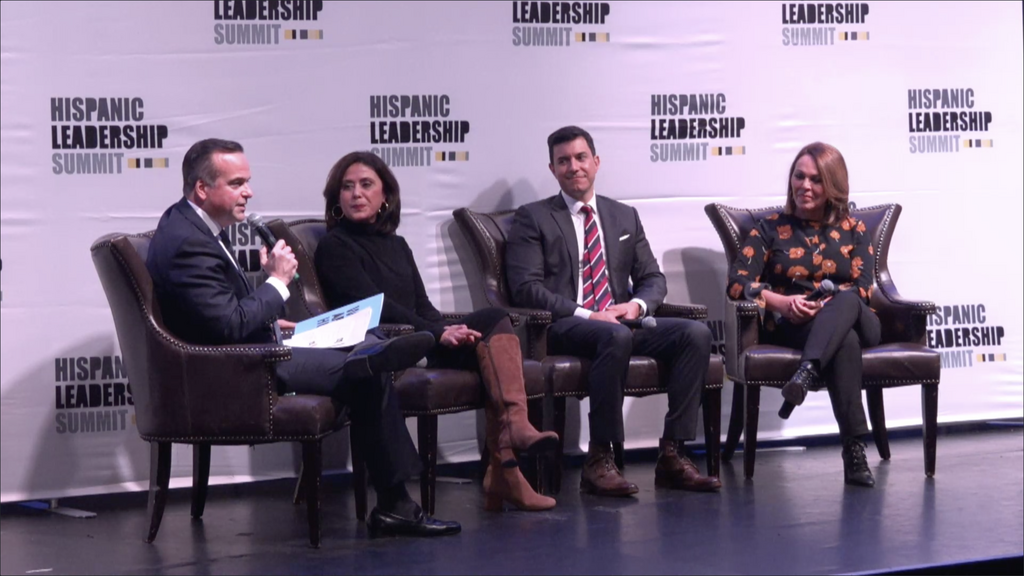
The need to elevate the Latino voice in media
Three influential Latino media professionals spoke on the value and significance of elevating the Latino voice in mainstream media.
When it comes to Latina broadcast journalists who have left their imprints on the media industry, very few are as accomplished as María Elena Salinas.
For 30 years, she was the anchor of the national Spanish-language news program, Noticiero Univision, covering just about every major national event that took place during that time.
While her name and face is often the most recognizable by the public, as she reflects upon her career and successes, she credits the collection of people around her.
“When we are journalists and we happen to be in front of the camera, we get a lot of recognition. But we are just part of a team that really makes this happen,” said Salinas during a panel discussion at the 2021 Hispanic Leadership Summit.
When she began her journalism career during the early 1980s, about 14.6 million people comprised the Latino community in the U.S. Today, that number has increased more than four times to over 62.1 million.
“I think we have played an important role in the growth of the Latino community,” Salinas said of Spanish-language media. “And the Latino community has played a vital role in the growth of Spanish-language media.”
Now an independent journalist, Salinas often reflects on one of the many goals she set out for herself when her career first started.
“I wanted to tell the Latino story,” she said. “I wanted to tell the Latino story in any forum, no matter how small and no matter how big.”
That desire prompted her to pursue a career in mainstream media to tell those stories, as telling these stories on Spanish language media platforms often limits the audience.
She noted two reasons for that. One being that the majority of Latinos are bilingual.
“Mainstream media is really losing out on a huge audience that they could be attracting if only they told our stories,” said Salinas. “It’s one of the reasons why sometimes Latinos gravitate towards Spanish language media; not only because of the language, but because of the content.”
The second reason is due to perception.
“The perceptions are really important,” said Salinas, noting that oftentimes perceptions come from what people hear from politicians or see in the media.
“So I think they would be doing a great service to our democratic process, if we just realize that we are Americans too, if mainstream media showed us as main players in our society,” she added.
While it has been an uphill battle, Salinas has ensured that stories of the Latino community are told at each stop in her career.
The desire to tell the real and true stories of the Latino community is also shared by Tom Llamas, anchor & senior national correspondent at NBC News.
The show he anchors on the network, Top Story with Tom Llamas, is a product of his experiences from his 20 years in mainstream media, as he’s witnessed a glaring lack of coverage of the Latino community.
So, he decided to launch “a very ambitious newscast at NBC News,” he said.
“I started thinking about this and I said, ‘there’s no reason, if I have an hour of news, that I can’t cover my community,’” said Llamas.
RELATED CONTENT
Top Story with Tom Llamas includes a segment that covers the stories of the people in Latin America, the Caribbean and Hispanics in the United States.
“Since I get to decide which stories are there, I decided it’s time to tell these stories,” he said.
In 2020, NBCUniversal announced a new “50% Challenge,” a commitment to ensuring that its newsroom and on-air talent contains 50% women and people of color.
For Emma Carrasco, senior vice president of corporate affairs for NBCUniversal News Group, her decision to join the organization was heavily influenced by the opportunity to work with the first and only Latino leader of an English language news organization, Cesar Conde.
She noted that having a Latino in that role is what sparked the bold ambition of making sure that the team more accurately represented the demographics of its audience.
The approach has been accomplished through the three C’s: Content, Connection and Culture.
“Those three things allow us to ensure that we are covering all of the communities that we serve, that the faces that you see across all of our brands are representative of the communities that we serve,” said Carrasco.
Looking ahead, Carrasco noted that now is the most opportune time to take advantage of the shifting demographics and continue using journalism to uphold the tenets of our democracy.
Llamas said that the most important thing for Latinos working in mainstream media organizations to do is to commit to helping at least one other person within their respective newsrooms.
“If you're not helping at least one person, you're not doing something right,” he said. “Somebody for sure helped you, so don’t forget that.”
For Salinas, she said she hopes to see a higher influx of Latino surnames entering the industry and to continue seeing and hearing those stories be told. As for her, she will continue to do her part.
“I'm gonna keep knocking doors, gonna keep insisting and I'm gonna keep on nagging them, even if they get mad,” she said.











LEAVE A COMMENT: